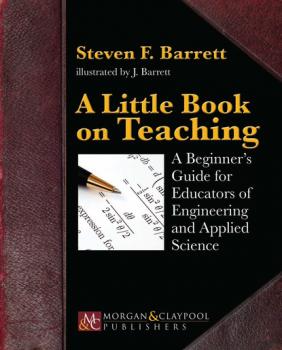Synthesis Lectures on Engineering
Скачать книги из серии Synthesis Lectures on EngineeringEmpowering Professional Teaching in Engineering
Each one of us has views about education, how discipline should function, how individuals learn, how they should be motivated, what intelligence is, and the structures (content and subjects) of the curriculum. Perhaps the most important beliefs that (beginning) teachers bring with them are their notions about what constitutes «good teaching». The scholarship of teaching requires that (beginning) teachers should examine (evaluate) these views in the light of knowledge currently available about the curriculum and instruction, and decide their future actions on the basis of that analysis. Such evaluations are best undertaken when classrooms are treated as laboratories of inquiry (research) where teachers establish what works best for them. Two instructor centred and two learner centred philosophies of knowledge, curriculum and instruction are used to discern the fundamental (basic) questions that engineering educators should answer in respect of their own beliefs and practice. They point to a series of classroom activities that will enable them to challenge their own beliefs, and at the same time affirm, develop, or change their philosophies of knowledge, curriculum and instruction.
A Little Book on Teaching
It is often a challenging and overwhelming transition to go from being a student to being a teacher. Many new faculty members of engineering and science have to make this dramatic transition in a very short time. In the same closing months of your Ph.D. program you are trying to complete your research, finish and defend your dissertation, find a job, move to a new location, and start a new job as a faculty member. If you are lucky, you've had the opportunity to serve as a teaching assistant and possibly have taught a university-level course. If you have served as a research assistant, your teaching opportunities may have been limited. Somehow, in this quick transition from student to teacher, one is supposed to become a good teacher and be ready for the first day of school.
This book is intended as a basic primer on college-level teaching and learning for a new faculty member of engineering and applied science. New faculty members in other disciplines will find much of the information applicable to their area of expertise as well. First and foremost, this book is about learning and teaching. However, it also provides helpful information on related topics such as mentorship, student challenges, graduate students, tenure, and promotion and accreditation.
This book is also intended as a reference for seasoned professionals. It is a good reference for those mentoring the next generation of college educators.
Table of Contents: List of Figures / What makes a Great Teacher? / A little learning theory / Preparation for the first day of classes / Assessment / Beyond the first day
Crafting your Research Future
What is it like to be a researcher or a scientist? For young people, including graduate students and junior faculty members in universities, how can they identify good ideas for research? How do they conduct solid research to verify and realize their new ideas? How can they formulate their ideas and research results into high-quality articles, and publish them in highly competitive journals and conferences? What are effective ways to supervise graduate students so that they can establish themselves quickly in their research careers? In this book, Ling and Yang answer these questions in a step-by-step manner with specific and concrete examples from their first-hand research experience.
Table of Contents: Acknowledgments / Preface / Basics of Research / Goals of Ph.D. Research / Getting Started: Finding New Ideas and Organizing Your Plans / Conducting Solid Research / Writing and Publishing Papers / Misconceptions and Tips for Paper Writing / Writing and Defending a Ph.D. Thesis / Life After Ph.D. / Summary / References / Author Biographies
Project Management for Engineering Design
This lecture book is an introduction to project management. It will be of use for engineering students working on project design in all engineering disciplines and will also be of high value to practicing engineers in the work force. Few engineering programs prepare students in methods of project design and configuration management used within industry and government.
This book emphasizes teams throughout and includes coverage of an introduction to projectmanagement, project definition, researching intellectual property (patent search), project scope, idealizing and conceptualizing a design, converting product requirements to engineering specifications, project integration, project communicationsmanagement, and conducting design reviews. The overall objectives of the book are for the readers to understand and manage their project by employing the good engineering practice used by medical and other industries in design and development of medical devices, engineered products and systems. The goal is for the engineer and student to work well on large projects requiring a team environment, and to effectively communicate technical matters in both written documents and oral presentations.









